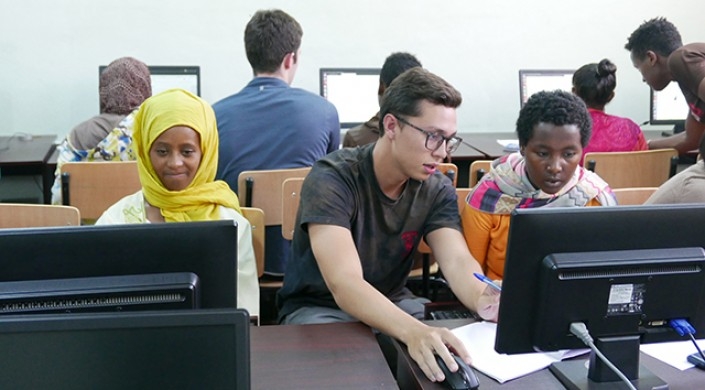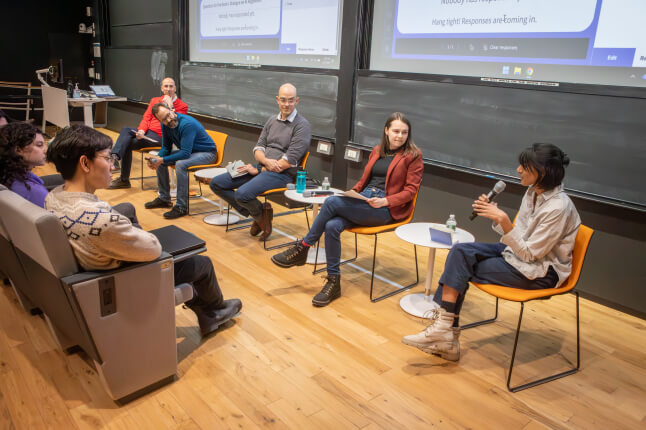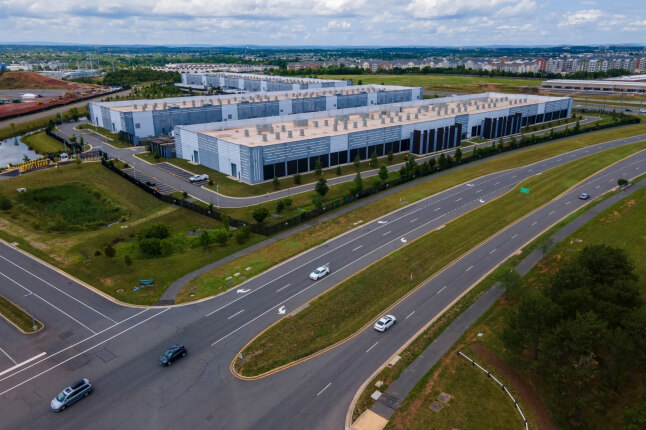News
Computer science concentrator Michael Cubeddu, A.B. ’20 (center) helps an Ethiopian high school student work through a complex programming problem. (Photo courtesy of AddisCoder)
For many Ethiopian high school students seeking an interesting and rewarding career, computer science doesn’t appear on their radar.
High-achieving students in this developing nation of more than 100 million often pursue medicine or engineering, said Jelani Nelson, an Ethiopian-American and John L. Loeb Associate Professor of Engineering and Applied Sciences at the Harvard John A. Paulson School of Engineering and Applied Sciences.
The AddisCoder program, which Nelson founded in 2011, is designed to change that.
A lot of students in Ethiopia like math, and computer science, especially algorithms, is very mathematical. But they don’t know this field even exists.
AddisCoder, a free, four-week summer program in Addis Ababa, Ethiopia’s capital, introduces high school students from around the country to the principles of programming and algorithms.
“This program is really about exposure,” said Nelson. “A lot of students in Ethiopia like math, and computer science, especially algorithms, is very mathematical. But they don’t know this field even exists. We want them to know that there are good career opportunities in computer science and the field is fun and interesting.”
Nelson launched the program after he finished grad school at MIT. He was visiting relatives in Ethiopia that summer, and wanted to use some of his vacation time to spread awareness of computer science. Nelson invited Ethiopian teens to apply by email, and he and a teaching assistant taught the course to an initial cohort of 82 students, mostly from elite private schools.
Seeking to expand the program to public school students for the second AddisCoder in 2016, he partnered with the Meles Zenawi Foundation, which sponsored room and board for the high schoolers during the program. The foundation collaborated with Ethiopia’s Ministry of Education to recruit top-performing students from across the country.
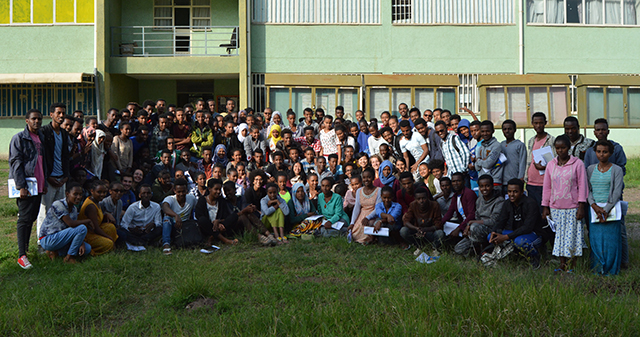
More than 170 Ethiopian high school students from across the country learned the principles of programming and algorithms during the free, four-week AddisCoder program. (Photo courtesy of AddisCoder)
This summer, more than 170 students enrolled in the third iteration of AddisCoder, which was led by three instructors and 20 teaching assistants recruited from all over the world, including three Harvard undergraduates. More than 20 Ethiopian college students served as lab assistants.
The intensive program, held at the Addis Ababa Science and Technology University, taught students the basics of Python programming and fundamental ideas in algorithm design and analysis. The hands-on program has only one to two hours of lectures each day. Students spend the bulk of their time in the lab solving problems and writing code.
Keeping up with a lab full of energetic high schoolers kept computer science concentrator Will Finigan, A.B. ’20, on his toes.
“I had never really done any teaching before, so this was a totally new experience for me and I didn’t know what to expect,” he said. “These kids were amazing. They were so into it, we had to basically drag them out of the lab each day when it was time to leave. They just wanted to keep working, and their excitement was contagious.”
Getting students up to speed during the tough, initial lessons was challenging, heightened by the fact that some were not proficient in English, Finigan said.
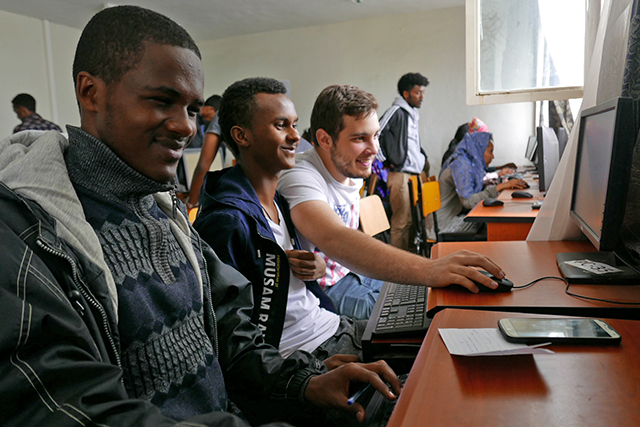
Dimitri Karev, A.B. ’21 (right) reviews coursework with Ethiopian high schoolers in the AddisCoder program. (Photo courtesy of AddisCoder)
The teaching assistants worked together to rewrite lessons using simpler language, while the Ethiopian lab assistants helped to translate for students who spoke one of the 82 languages used throughout the diverse East African nation.
The high schoolers, all top performers on a nationwide math exam, were not only diverse in the languages they spoke, but also in their familiarity with technology. Dimitar Karev, A.B. ’21, worked with some students who had never even used computers before, and others who could barely type. But he was impressed by the students’ drive to learn the challenging material.
One student who lacked any coding experience was captivated by the lessons and worked extra hard, scoring at the top of the program’s first exam, Karev recalled.
“For us, the most important part was not to teach them absolutely everything there is to know about programming or Python or algorithms,” he said. “It was much more important to motivate them and ignite that spark of interest in computer science.”
The teachers learned a great deal from the program, too, said computer science concentrator Michael Cubeddu, A.B. ’20. Not only did the daily exercises serve as a useful refresher of some basic computer science concepts, but interacting with the diverse group of teaching fellows, which included Google and Dropbox software engineers and Ph.D. students from Stanford and Carnegie Mellon University, exposed him to some of the latest trends and concepts in research and industry.
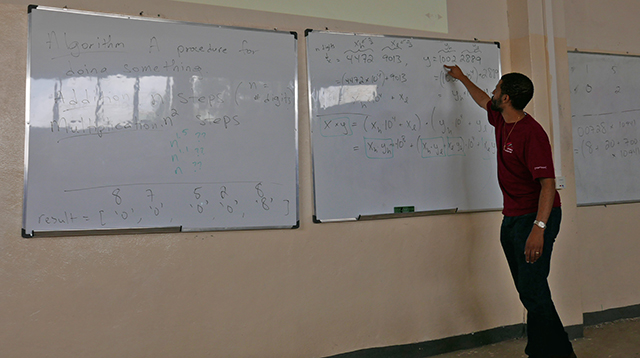
Jelani Nelson, John L. Loeb Associate Professor of Engineering and Applied Sciences, presents an algorithm lesson to AddisCoder students. (Photo courtesy of AddisCoder)
“Working with so many bright minds was really interesting and inspiring,” he said. “Being immersed in a unique culture and interacting with so many different people was a great experience. The students came from so many different regions, it was really like a sampling of the entire Ethiopian population. I was fortunate to be able to experience that.”
Nelson is planning to offer AddisCoder again in the future, though the exact date of the next course has yet to be determined. He is excited to see the program continue to grow.
Two high schoolers who participated in the 2018 program launched a spinoff AddisCoder course in their home region in August, and with more than 20 Ethiopian college students now trained as lab assistants, Nelson hopes they amplify the impact of AddisCoder, enabling even more students to learn about computer science.
“When I first learned how to code myself, it was in 12th grade with little guidance. I remember buying some books on C and C++ in a store, reading them, then giving myself coding exercises. I didn’t even know what an algorithm was until two years later as a college sophomore,” Nelson said. “I hope that programs like AddisCoder can expose kids early and get them interested, and also provide them with a head start as they go into college.”
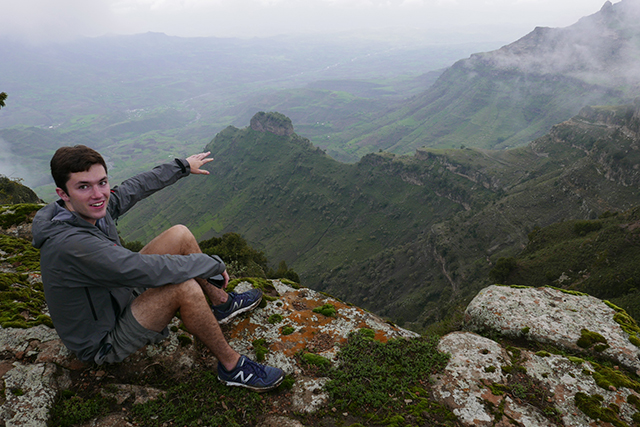
Computer science concentrator Will Finigan, A.B. ’21, enjoys the view during a trip to the mountains. (Photo courtesy of AddisCoder.)
Follow AddisCoder on social media
Topics: Computer Science, Entrepreneurship
Cutting-edge science delivered direct to your inbox.
Join the Harvard SEAS mailing list.
Press Contact
Leah Burrows | 617-496-1351 | lburrows@seas.harvard.edu
